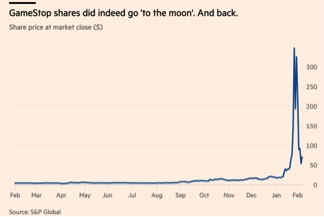All data indicates a new age of interest in retail investing. Across the world more people than ever are starting to trade for the first time, with reports of retail participation in the US stock market, for example, increasing from 10% in 2019 to 25% in 2020. Even during a public relations disaster, Robinhood- the U.S retail-focused trading app- onboarded 600k new clients in a single day. Our brokerage, Equiti Group/ FXPesa, saw volumes and client numbers increase by multiples across all our key markets and this will continue through this year.
The pandemic created an environment where people were looking for an income in the safety of their own home and, logically, that trading/ investing answered that need. Anything that brings a heightened awareness of financial literacy is a great thing, but it’s also something that we need to nurture. With millions entering the financial markets for the first time, unfortunately, scams, misinformation and false promises follow, and we must increase consciousness of this.
Social Networks: Most of the world has been following the journey of a supposed war between those on a Reddit forum called r/WallStreetBets and hedge funds betting on the demise of American electronic games supplier GameStop (going ‘short’). This battle was trending on all major social networks, such as Twitter, Facebook, Telegram and Instagram. These networks are powerful, Reddit has 160 million unique visits to its site each month.
People that had never invested before frantically set up trading accounts and placed trades with as much capital as they could put their hands on. Some naïve first-timers often had very little notion of risk or what they were doing, but instead paid full attention to the latest funny meme or influencer that told them that this stock was ‘going to the moon’. It did, and then it came back again leaving a lot of people losing a lot of money.

Ignoring Fundamentals: Social networks and online personalities have an increasing amount of influence over investors. Recently, Elon Musk the CEO of Tesla added 12% to the value of Bitcoin simply by changing his bio to the bitcoin Twitter hashtag. With the wave of memes, online ‘experts’ and celebrities pushing their agendas, the fundamentals of great companies are becoming secondary. We need to acknowledge this and attempt to educate differently.
A perfect example of this was the recent movement in the Silver price. Silver is widely regarded as an undervalued metal, mainly because of its increasing utility in ‘green technologies’, such as solar panels. Various reports declare solar panels and wind turbines will require three times more silver than what is used today. Silver is also used in electric car production and other tech of the future. When the silver price jumped 12% (its biggest intraday rise since 2008), it was not because of these fundamentals. The price jumped primarily because social media declared the same war with hedge funds and decided to try to do the GameStop ‘trick’ again, making the Twitter hashtags #shortsqueeze and #silvershortsqueeze trend across the world. The silver market is huge and not as easily manipulated as a relatively small stock such as GameStop, and so this attempt was doomed, with silver retracing back very quickly and lots of retail traders losing more money.
All this focus away from fundamentals, meant that the market was quite late to understand the stellar Q4 earnings shown by some great companies, especially Big US Tech firms. Amazon posted $126 billion Q4 revenue and shows no sign of slowing. Google saw a 23% revenue growth in Q4. Unfortunately, the circa 4-6% share price increases these saw due to these results aren’t considered attractive enough to those only seeking the 16x returns GameStop gave some in just 2 weeks. There is so much real opportunity in the markets, especially now.
Scams: If you were to investigate your junk mail (don’t!), you would have probably been sent a scam email within the last 24hrs. It is most likely centred around cryptocurrencies, where it is promising huge returns from trading obscure crypto that you have never heard of. Some of the recent scams are from hackers sending out tweets from reputable, businessmen like Jeff Bezos and even former presidents such as Barack Obama’s certified accounts. They ask for the trusting public to send bitcoin to a wallet and then wait for 2x back.
Unfortunately, as unlikely as these scams may seem, the public is losing millions of dollars to them daily. In today’s ‘at once’ society, many aren’t thinking of growing knowledge and wealth over a long period. Instead, they want instant gratification and huge profits, as is the expectation in most walks of life now. Now, if you want something, you want it immediately- but my experience of wealth generation is the very opposite of this. It takes time to do it right.
Long-term side-effects: Social media has been an excellent source of information for new traders, keen to improve their financial futures. However, there is cause for concern if these young and new entrants blindly follow investment ideas that they do not understand, just because the herd are doing the same thing. We have a huge wave of first- time traders ignoring great companies that have incredible distribution channels and solid, multiple revenue streams, instead opting to follow a funny meme of Elon Musk and a Shiba Inu dog (DogeCoin).
A glaring issue is I don’t see how it can work out for these traders. If they make money in these pump-and-dump Reddit schemes, for example, they will invariably put more into the next one and continue until they lose everything. In this search for increasing returns, they are also susceptible to false promises and scams. On the flip side, if they lose their money in the first attempt, they are likely to shut their accounts and never think about their financial futures again. That is a tragedy.
It is far better to work with a brokerage to diversify your investments across global asset classes, regions and short and long-term plays, concentrating on sound fundamental and technical analysis…improving your knowledge day by day, year by year. Understanding this gives you a great chance at achieving real wealth. This has always been exciting enough for me, no meme needed.
A guest post by Brian Myers (@bjmyersUK), the CEO at Equiti Capital UK.

